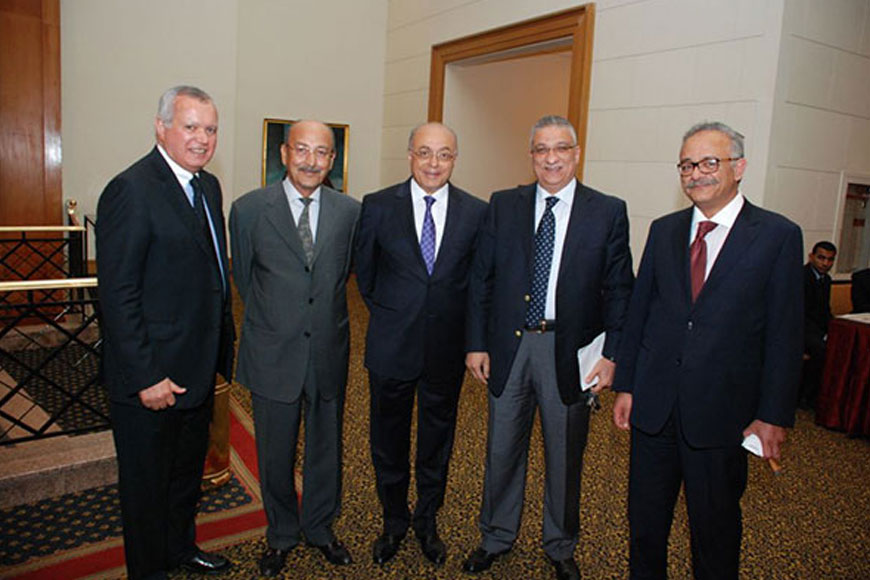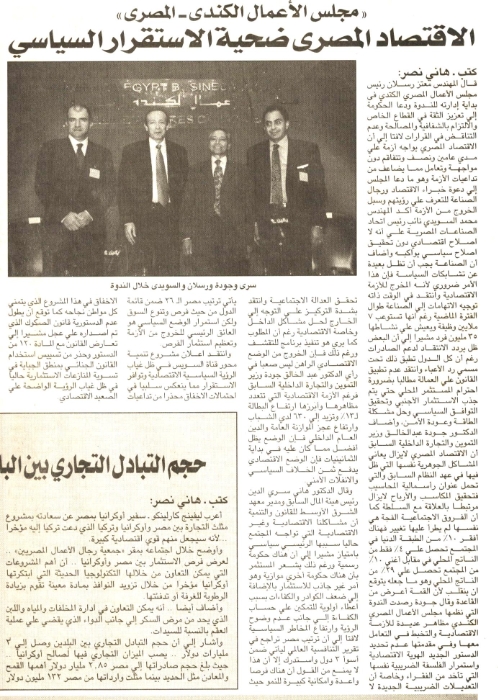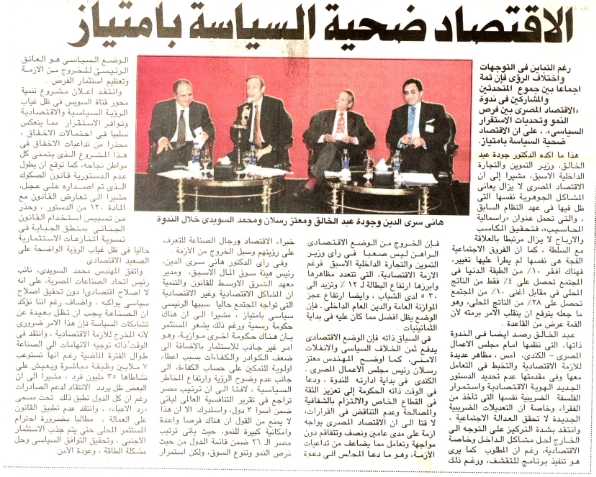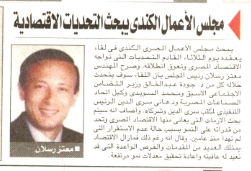
Date
Speaker(s)
Designation
Description
The Canada Egypt Business Council (CEBC) hosted a special event and panel discussion featuring H.E. Dr. Gouda Abdel Khalik, Professor of Economics at the faculty of economics and political science and Egypt’s former Minister of Social Solidarity. Joining at the panel were Egypt’s renowned economic and business veterans, Dr. Hani Sarie El Din , Founder and Chairman of Sarie-El Din & Partners and Eng. Mohamed Elsewedy Deputy Chairman of the Federation of Egyptian Industries.
CEBC Chairman, Eng. Motaz Raslan, started the discussion by outlining the current dismal state of the economy. He highlighted the difficulties experienced by the business community today emphasizing the need for the new government, which has witnessed a reshuffle only a few days before the event, to send messages of reassurance to investors in Egypt, foreign and domestic. He asserted that along with transparency, this is crucial in overcoming the current crisis.
Dr. Gouda Abdel Khalik is a long-time advocate of the rights of the poor and one of modern Egyptian history’s leading socialist figures, he then took the floor thanking Raslan for the opportunity to address this distinguished business community at these adverse times. The former minister explained that the current economic situation is a victim of deep political divisions. There are divisions in the ruling party, just as much as there is in the opposition, he clarified. He continued to say that Egypt is going through a phase of political childhood. Dr. Abdel Khalik said that upon the dissolution of parties in 1954, a single party system prevailed, even if there was a degree of diversity when the multiparty system was reinstated under Sadat. The Revolution brought forth an end to this and allowed for diversity, he said. However, this diversity is an “Ahlawy-Zamalkawy-type” diversity, in which each faction is loyal to peripheral affiliations more than it is to the main affiliation that is to Egypt. He confirmed the need to unite under the common Egyptian identity.
He confirmed the need to build a political system that is based on transparency, respecting the other’s opinion and on citizenship. On the stance of the opposition, Dr. Abdel Khalik said that turning your back to your opponent is not politically sound, “This has grave consequences and it should not be taken lightly”. He added that both the ruling party and the opposition need to react to each other’s stands on diverse matters differently. He asserted that inclusion is the main characteristics of a healthy political system.
He also pinpointed the need to acknowledge the mistakes that were committed during Egypt’s rocky transitional period. He mentioned the upcoming parliamentary elections. He noted his disagreement with opposition groups calling for boycotting the elections. He explained that when the people voted for the Muslim Brotherhood’s Freedom and Justice Party, they were not voting for the religious current, but for an alternative to the former regime. Now, that their capacity has been tested as they assumed power, people will vote differently. “The people are looking for an alternative again”, he said.
“[Egypt’s political system] continues to be crony capitalism,” he said explaining that the current economic system is no different from that under Mubarak and Sadat. Economic policies have not changed, he added. He pinpointed the gap that remained between the poor and the wealthy of Egypt. He indicated that the newly-adapted constitution did not define the economic identity. Dr. Abdel Khalik asserted that there are two components that are quintessential for emerging from the current economic situation. These components are proficiency and justice. He accentuated that the order of which is intentional. He continued to explain that without proficiency, the Egyptian economy cannot achieve justice. “Demanding justice was the Egyptian story until 25 January, and still is, to some extent, now.”
There are promising possibilities, if the current policies are rectified in the correct direction, Dr. Abdel Khalek continued. In the 80’s and 90’s, the situation was more serious, deficit was higher than currently. The internal debt was above 100%. The external debt was also great however; Egypt was able to overcome that period. He emphasized that the solution needs to include all Egyptians and needs to give special attention to the poor and to the middle class. He drew the audience’s attention to the need for inclusive growth urging for adhering a great deal of importance to fighting unemployment that is currently averaging at 11%, however goes up to roughly 30% among those in the age group of 25 – 30. He warned that this is a bomb that waiting to explode at any moment.
On the legislative side, he said that the Shura Council passed a number of tax laws. He said that the new legislation does not address social justice, which was at the top of the revolution’s list of demands.
On the economy, he mentioned low and decaying foreign-exchange reserves, which barely cover the bill for three months of imports. He also mentioned deficit which now amounts to 10% of GDP. The plummeting value of the Egyptian pound is another facet of the economic crisis, which the former minister pinpointed. Dr. Abdel Khalek concluded noting his dissatisfaction with what the current government is presenting pertaining to the economy. He said that he is unhappy with the so-called National Project for Social and Economic Reform due to its approach. “It seeks to address the problem by external means”, he said. He added that an Egyptian’s average income, which is around $6,600, ranks higher than that of the Chinese or Indian, while the investment rate in Egypt is at only quarter or third that of these countries. We are obliged to go for an austerity program, he said. “There is not any country that can extend a helping hand to Egypt, members of the international community are also suffering crisis, and the EU is a prime example”. He said that the onus lies on the government, the people and the business community to get Egypt safely out of the crisis.
Following Dr. Abdel Khalek’s word, Dr. Hani Sarie El Din assumed the floor. Dr. Sarie El Din is the former head of Egyptian Capital Market Authority; he is also a professor of Commercial and Maritime Law at Cairo University and the founder and current chairman of the Middle East Institute for Law and Development (MILD). “The current regime decided to battle with the recent past, to evoke the distant past and to antagonize the present – represented by the partners of January 25 – and thus quite brutally neglects the future” Dr. Sarie El Din commenced his word. He continued saying that the philosophy of the current regime is to continue battling the former regime, without learning from its mistakes. “They often criticize the former regime, without any attempts to rectify its corruption. On the contrary, they are using all its old ways”, he said.
Dr. Sarie El-Din continued to give a summary of what he believed the current regime’s mistakes to be. He said that the current ruling party’s priority is “empowerment [of itself] and exclusion”. He continued to say that this has led to rushing through a number of steps, such as the draft of the constitution, and the parliamentary elections before it, which lead to their empowerment. He added that this takes place side by side with clamping down on freedoms, and specified freedom of association. He revealed that another challenge that the current regime introduced on the scene is a shadow government, “to a point that it unclear who is the real decision maker, which is very confusing to investors and is an unacceptable situation”, he said. He also criticized that the appointment of unqualified loyalists in key positions, by the current regime, which makes the situation worse.
Pertaining to the economy, he said that despite the many challenges it faces, Egypt, with its resources and status can overcome the current crisis. However, he said that the solution is political in the first place.
Moving on to the legislative and legal aspects of the economy and in the context of the recent passing of a law regarding investment in the Suez Canal, he said that there is no disagreement as to the importance of developing Suez Canal, but “we do not want a new Toshka.” He said that it will be a grave disappointment, if it fails to achieve its potential. He asserted that a project of this size cannot take place unless as part of an overall economic vision for Egypt and that rushing in such a project to score popularity points will be catastrophic.
On the “Sukuk” issue (Islamic bonds), he said that “diversity in funding tools is welcome; the problem is with changing the face of already existing mechanisms to later give credit for it to the Islamic project.” He added that with the meager percentage it comprises of worldwide bonds and securities, and Egypt’s ‘C’ credit rating, it is impossible to promote it as valid mean of investment. He also deemed Sukuk law unconstitutional.
On investment law suits, he said that the regime attempted to achieve political goals through judicial proceedings. “This will only lead to the destruction of the legal system”, he said. He continued to explain that the current regime made a mistake when it arbitrarily went after investors and pursued actions against them that did not have sound legal grounds. He emphatically stressed on the importance of transitional justice in this context.
Eng. Mohamed Elsewedy, Deputy Chairman of the Federation of Egyptian Industries, assumed the floor. At the onset of his word, he highlighted that the institution he represents is not political in nature. He said that while industrial companies are not a political player, they cannot move forward without progress in politics. “Industries paid a very heavy bill since the Revolution,” Eng. Elsewedy said. He said that industrial businesses have been tainted by accusations of illegal requisition of land among others. The industrial sector is supporting the lives of 25 to 30 million people, he highlighted. He said that he rejects the notion of reconciliation with businessmen. “Businessmen are not criminals in need for reconciliation.” He said that lenience in applying the law at many levels is harming current investors and potential investment. He concluded that there are promising opportunities. However, he continued to say that there are serious steps that need to be taken on part of the government in several areas, of which are vocational training, transportation and housing of labor. He said that in order to achieve progress in these areas political consensus is essential.
Elsewedey stressed on a number of challenges that cause great damage to industries. He mentioned the energy problem, the security vacuum, the absence of Chapter 11 protection for investors, among many problems. He said that there needs to be a fast-paced decision making process.
The floor was opened for questions. Questions covered a wide range of subjects from questions pertaining to the need to give special attention to agriculture to de-privatization and its impact on investment.
In light of a disappointing repetition of the former regime’s worst policies, especially after a revolution that was awe-inspiring to the world, there is little hope for political consensus and stability. However, despite the depressing economic indicators and the lack – or possibly slow – reaction on part of the government, Egypt’s nascent democratic foundation will hopefully earn Egyptians the economy and standard of living they revolted for.


























